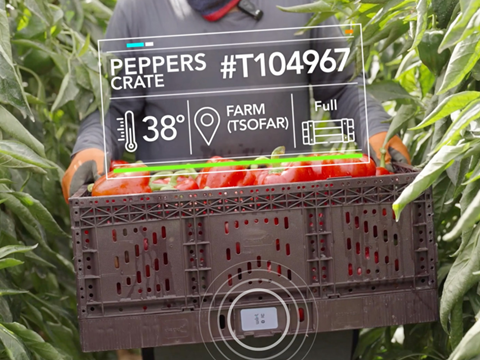
Wiliot’s WiliBot – a generative AI chatbot that communicates with ambient IoT-connect products – seeks to improve visibility throughout supply chains by facilitating conversations between businesses and their stock.
As part of Wiliot’s Ambient Data Platform, stamp-sized, self-powered IoT Pixels are attached to packaging, containers, crates, pallets, and products. These communicate information like location, temperature, humidity, and carbon footprint via Bluetooth; these are then received in the Wiliot cloud, wherein businesses can analyze the data.
From here, the company’s AI and machine-learning algorithms can identify supply chain “events”. These can be used to automatically generate alerts or AI responses with which businesses can optimize or improve their operations; for example, responding when shipments of pharmaceuticals or produce have been handled at unsafe temperatures.
Built on top of a large language model (LLM), WiliBot seeks to bring together the capabilities of Ambient IoT and the computational power of GenAI in order to enhance visibility throughout supply chains.
“Ambient IoT and generative AI are increasingly symbiotic technologies,” explained Wiliot CEO Tal Tamir. “Ambient IoT generates vast amounts of data about trillions of everyday things, and GenAI can uniquely make sense of all that data.
“On the flipside, GenAI learns by analyzing vast amounts of data. To a real extent, that data has so far been finite, but ambient IoT presents massive new physical world datasets that a GenAI platform like WiliBot — and others — can use to describe products, materials, supply chains, and everything connected to the internet.
“Although Wiliot’s work in generative AI is relatively recent, the company has long been a pioneer in artificial intelligence and machine learning for deriving insights into ambient IoT data,” Tamir continued. “As more companies have begun rolling out Wiliot’s Ambient Data Platform, we’ve been asked how GenAI capabilities might make the transformation even easier. Our answer is WiliBot, the real-world combination of ambient IoT and AI.”
Wiliot believes that the importance of the linkage between ambient IoT and AI has been recently borne out in projects with leading food retailers. In the projects, the Wiliot Ambient Data Platform apparently revealed that food shrink accounts for roughly 5 percent of goods in the food chain – food that is lost, damaged, or spoiled before it reaches store shelves.
Wiliot claims that its platform is able solve two-thirds of these food shrink issues – ensuring a safer food supply, higher customer satisfaction, and lower costs – while WiliBot will now aim to democratize access to these insights across the organization.
WiliBot will begin piloting with key customers, with a wider rollout expected later this year and into 2025. A similar combination of ambient IoT and generative AI is set to be available to consumers in the future, both in-store and at home, through an ecosystem of mobile apps – enabling them to gauge a product’s carbon footprint, material composition, ethical sourcing compliance, freshness, and more.
“Wiliot’s Ambient Data Platform already allows companies to gain unprecedented intelligence about trillions of products,” added Tamir. “Now more businesses – and in the future consumers – will be able to ask about and easily understand everything about those products. With WiliBot, we’re answering the question, ‘What if your products could talk?’ Now they can, in natural language, thanks to WiliBot.”
Between 8th – 10th October 2024, Wiliot will display WiliBot and its Ambient Data Platform at MWC Las Vegas in West Hall Booth 910. A session titled “5G Advanced Release 19: Transforming Industries with Ambient IoT and AI” will also be run on 9th October, in which Wiliot will discuss the convergence of ambient IoT and artificial intelligence.
In 2023, Wiliot was nominated for a Sustainability Award under the commercialized Active & Intelligent category for its Ambient IoT Visibility Platform. The company claimed that real-time, daily measurements of carbon footprints are “only made possible thanks to the latest smart tag technology” and improve upon the retrospective, annual or quarterly assessments that the industry currently relies on.
Another development stems from a collaboration between Avery Dennison and Controlant. The companies have geared a digital platform provider towards the pharmaceutical industry in pursuit of real-time, end-to-end visibility. The Saga Card is a compact monitoring device that, when combined with Controlant’s Aurora cloud platform, provides real-time inventory visibility at country, region, and city levels.
PicoNext has also designed a generative artificial intelligence capability for its Digital Product Passport (DPP) platform, analyzing and summarizing raw product data into sustainability metrics to lower the time and costs spent publishing DPPs. The PicoNext AI Assistant takes on raw, unstructured product data in various formats, which can then be used to quickly and automatically summarize the sustainability metrics in a DPP template in line with regulatory standards. These include material origins, carbon footprint, environmental impact, and recycling, among others.
If you liked this story, you might also enjoy:
How are the top brands progressing on packaging sustainability?
Sustainable Innovation Report 2024: Current trends and future priorities
Reuse vs. single use – which is better for the environment?
The ultimate guide to global plastic sustainability regulation













No comments yet